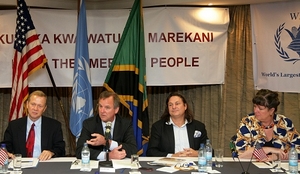Press Releases 2013
- Translation:
- Kiswahili
U.S. Ambassador to the United Nations Food and Agriculture Agencies in Rome David J. Lane Leads Food Security Focused Media Tour to Tanzania
January 12, 2013

U.S. Ambassador to the United Nations Food and Agriculture Agencies in Rome David J. Lane (second from left) elaborating a point during a press conference held in Dar es Salaam on January 12, 2013.
Ambassador David J. Lane, the U.S. Permanent Representative to the Rome-based United Nations Food and Agriculture Agencies, led a media tour to Tanzania from January 7 – 12, 2013. He visited rural communities in and around Arusha and Kilimanjaro Regions and in Mkruranga District in the Southern Growth and Agricultural Corridor (SAGCOT) to observe how the United States government and the UN Food and Agriculture Agencies collaborate to support farmers, businesses, and Tanzanian government officials improve food security and promote agricultural development. Following Tanzania, the delegation will travel to Malawi from January 13-15 to survey similar agricultural projects there.
Ambassador Lane was accompanied by a cadre of seven print and radio journalists from Italy, Ghana, Tanzania, Uganda, Malawi, France and Niger who report for both national and international news agencies. They visited a variety of projects sponsored by the United States government through the United States Agency for International Development's (USAID) Feed the Future Program; the UN Food and Agriculture Organization (FAO); the World Food Programme (WFP); and the International Fund for Agricultural Development (IFAD). The traveling delegation also included USAID Mission Rome Senior Humanitarian and Development Advisor Chris Shepherd-Pratt.
The delegation met with program beneficiaries and toured agricultural projects in the North and South of Tanzania, including: Jihudi Leki Tatu and Oitera Village Farmer's Groups supported by USAID/Feed the Future's Tanzanian Agricultural Productivity Program (USAID-TAPP); a United States Department of Agriculture (USDA)/Land O'Lakes supported Food for Progress dairy production program; WFP-sponsored Food for Assets Projects in Leki Tatu and Sakila Village, a Food for Education project at Arkatan Primary School, Monduli District, and a Purchase for Progress in Kware Village, Hai District; FAO supported projects on cassava growing and multiplication of disease-free cassava planting material in Hoyoyo, Mkuranga District; and an IFAD agricultural marketing systems development project in Maili Sita Village, Hai District which benefits smallholder women farmers in producing and packaging their products for market-scale sale.
At the end of his tour in Tanzania, Ambassador Lane commented, "I am very encouraged by how the UN Agencies, private sector, Tanzanian farmers and development partners like the United States are working together with the Tanzanian government to strengthen Tanzanian agriculture and improve the future of the country. The communities and projects that we visited over the past week are proof that, despite the challenges we face, investing in small holder agriculture can substantially improve food and nutrition security and help local economies thrive." Ambassador Lane also noted that, "Tanzanian commitment to enacting agribusiness friendly policies and increased public spending for agricultural growth will encourage private investment --including by small holder farmers themselves-- and ultimately help transform Tanzania into a bread basket for the region."
WFP Country Representative in Tanzania Richard Ragan emphasized that, "With support from the United States, improving food security and helping develop commercial opportunities for small share holder farmers is top priority for WFP work in Tanzania." He continued, "Ambassador Lane's visit was an opportunity for him to witness firsthand the progress Tanzanians have made in this area. Significant work remains but so far the results are very exciting."
FAO Country Representative in Tanzania Diana Tempelman added, "The country has enormous potential for increasing agricultural productivity and production, which is needed not only to feed its rapidly increasing urban population but also to support overall development of this growing nation."
USAID Feed the Future Team Lead Tom Hobgood remarked that "the UN Agencies, Feed the Future, and our development partners are supporting Tanzanian-led efforts to increase productivity and incomes of small holder farmers, especially women, which is the key to Tanzania's economic growth." Mr. Hobgood further noted, "Ambassador Lane's visit provided an excellent opportunity for the international journalists to learn firsthand more about the opportunities and challenges to improve agriculture and nutrition."
For further information on USAID, USDA, and the UN Food and Agriculture Agencies' projects in Tanzania please see their websites:
USAID: www.feedthefuture.gov/country/tanzania; www.usaid.gov/tanzania/agriculture-and-food-security
WFP: http://www.wfp.org/countries/tanzania-united-republic-of/operations;
FAO: http://www.fao.org/countryprofiles/index/en/?iso3=TZA&subject=4;
IFAD:http://operations.ifad.org/web/ifad/operations/country/projects/tags/Tanzania
USDA: http://www.idd.landolakes.com/stellent/groups/public/documents/web_content/ecmp2-0138768.pdf (PDF 117KB)


